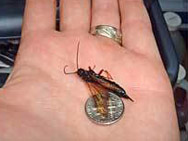rigelan wrote:Those space wasps would be huge!!!!! Worse than Jumanji.

Say, its only a paper moon
Sailing over a cardboard sea
But it wouldn't be make-believe
If you believed in me
Yes, it's only a canvas sky
Hanging over a muslin tree
But it wouldn't be make-believe
If you believed in me
-------------------------------------------------
'Alien' Wasp Kills Whole Forests
Scientists Warn Now that Wasp Is Here and Poses Huge Risk to Pine Trees
ABC News, March 8, 2006 --
<<An invader has entered the United States and it could devastate pine trees across the country, especially throughout the lush forests of the Southeast.

The wood wasp -- Sirex noctilio Fabricius -- has wiped out huge stands of trees in the Southern Hemisphere, killing 80 percent of the trees in affected forests in New Zealand, Australia, South America and South Africa. Scientists have dreaded the day when the alien wasp might make its way into the United States, but the wait is now over. It ended last year when Richard Hoebeke, an expert taxonomist at Cornell University, opened an insect trap in New York State. Inside the trap he identified the first Sirex woodwasp ever found in the wild in the United States. Since that discovery, entomologists have scattered out across New York, finding wasps over a wide area. And farther north, Canadian officials have found the wasp there, raising questions about just how widespread it already is. It's already too late to eradicate the wasp, Hoebeke says. "We are looking at long-term management and control," he says. "We've found the wasp in too many places."
Once the wasp penetrates a tree to lay eggs and produce the next generation, the tree begins to die. Not because of the wasps, or the resulting larvae, but because of a symbiotic fungus that the female wasp also introduces into the bark of the tree to provide food for the larvae to survive. The fungus attacks the tree, and it can kill it in less than a year. Government officials and the North American Plant Protection Organization recently issued dire warnings about the danger. The wasp likes all sorts of conifers, but it has a particular taste for pines. Death comes fairly quickly to the trees, although that may not be obvious at the time.
"When the wasp attacks a tree, the tree within that season will start to die," Hoebeke says. "You'll start seeing wilting of some of the upper branches, discoloration and yellowing, and eventually death." Beads of resin will trickle down the trunk from the tiny hole left for the exodus of the adult wasp, but that's about all.
Authorities think the wasp arrived in this country in wooden packing crates, or pallets, since that's precisely the kind of wood the wasp prefers. The larvae can live in the harvested wood, which is usually untreated, for more than a year, and that's plenty of time for the wood to be fabricated into containers and shipped into the United States. Hoebeke says he wasn't all that surprised when he found the first wasp. Considering the amount of cargo that moves into this country every day, much of it packaged in wood, it was only a matter of time.
So now it's here, but what can be done about it? There is some hope that the critter can be managed and kept to a tolerable level. Authorities in the southern hemisphere, particularly in New Zealand and Australia, have had considerable success using a natural bio-control agent. A particular parasitic worm, a nematode, has turned out to be a pretty good match for the wasp. The nematode is introduced into the forest, and it gets into the larvae of the wood wasp, leaving the eggs infertile. It's a tidy system in which the adult wasps pick up the nematodes and distribute them along with their larvae, forming sort of a search and destroy network. "In the Southern Hemisphere it has been a silver bullet," Hoebeke says. "It has kept the wasp population under control." That's a dramatic change from just a few years ago, when the wasp was destroying trees by the thousands.
But would the same strategy work here? Experts think it's promising, but the situation here is much more complex than it was to the south. Our forests are more diversified, as well as our wasp population, and no one wants to wipe out all wasps. After all, they eat many other harmful insects, and they provide food for a wide range of animals. There's always the concern that introducing a "bio-control agent," even a tiny nematode, could backfire. But at this point that's about the only thing that looks promising.
Hopefully, Hoebeke says, it's not already too late. The forests in this country are already under attack by beetles, fungus and all sorts of burrowing animals. In Alaska, for example, it is possible to drive for miles through dead spruce trees, killed by beetles that move across the landscape like an invisible plague. "We didn't need another invader," says Hoebeke.
But Sirex noctilio Fabricicus is here, none the less.>>
-----------------------------------




